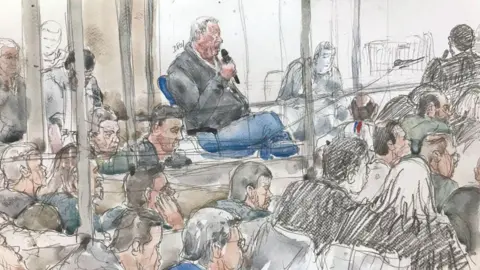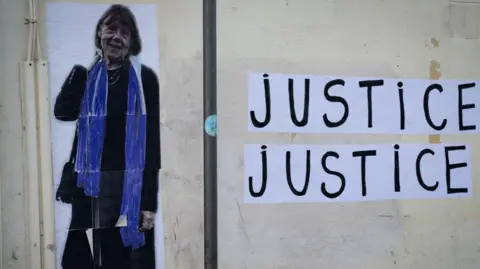 CLÉMENT MAHOUDEAU/AFP
CLÉMENT MAHOUDEAU/AFPJudges in Avignon sentenced Dominique Pelicot to 20 years in prison for aggravated rape in a gang rape trial that made a 72-year-old woman a feminist icon.
The court found 47 of the men guilty of rape, two guilty of attempted rape and two guilty of sexual assault.
For nearly a decade, Gisèle Pelicot was drugged by her ex-husband Dominique, who admitted to raping her and inviting dozens of men he recruited online to have sex with her in her bed at home while she was unconscious and unresponsive.
It was his decision to renounce his anonymity and launch this trial into the open – in his own words, “shifting shame” from the victim to the rapist.
Even if Dominique Pelicot acknowledges the accusations against him, most of the other men on trial deny having committed rape.
Dominique was also found guilty of attempted aggravated rape of the wife of one of the co-defendants, Jean-Pierre Maréchal. Dominique was also found guilty of taking indecent images of his daughter Caroline and his stepdaughters Aurore and Céline.
Maréchal was convicted of attempted rape and aggravated rape of his wife, Cillia, as well as drug charges.
Prosecutors had sought prison terms ranging from four to 20 years, the maximum sentence for an aggravated rape charge.
One of the accused, who admitted to the accusations, had previously called the trial was rushed and “botched”.
Activists said the case proved the need to incorporate consent into French rape laws, as in other European countries.
What is it about?
From 2011 to 2020, Dominique Pelicot administered tranquilizers and sleeping pills to his wife without her knowledge, ground them into powder and added them to her food and drinks.
Gisèle Pelicot suffered memory loss and fainting spells from medication and spoke of 10 years of her life wasted.
He was eventually arrested because a security guard reported him to the police for taking upskirt photos of women in a supermarket.
“I thought we were a close couple,” she once told the court. Instead, her husband would go to a notorious but now banned website called Coco.fr to invite local men to their home to have sex with her while she was in a coma.
“I was sacrificed on the altar of vice,” declared Gisèle Pelicot at the start of the trial.
Since the beginning of September, Judge Roger Arata and his four colleagues have learned how 50 men, now aged 27 to 74, went to the Pélicots home, in the village of Mazan.
Who are the accused?
 Benoit PEYRUCQ/AFP
Benoit PEYRUCQ/AFPDominique Pelicot admitted all the accusations against him: drugging and raping his wife and recruiting dozens of men to rape her. Prosecutors want judges to give him the maximum sentence of 20 years in prison for aggravated rape.
“I am a rapist,” he told the judges. “I acknowledge all the facts [of the case] in their entirety.” He apologized to his ex-wife and three children, but his actions tore the Pelicot family apart.
The other accused come from all walks of life and most of them come from a radius of 50 kilometers around the village of Pélicots, Mazan. The fact that they are firefighters, security guards and truck drivers has earned them the nickname Mr. Everyman. Most of them also have children.
Fifty of the 51 are accused of aggravated rape and attempted rape.
Romain V, 63, faces 18 years in prison if convicted. He is accused of raping Gisèle Pelicot six times even though he knew he was HIV positive. His lawyer says he couldn't have passed on the infection because he underwent years of treatment.
Ten other men could face sentences of 15 to 17 years, and prosecutors are seeking prison terms of 10 to 14 years for 38 of the others.
Before the verdict, one of the few men who admitted to the rape told the BBC, through his daughter, that many people had made up their minds straight away: “There wasn't enough time. For me, it was a shoddy job.”
The average prison sentence for rape in France is 11.1 years, according to the French Ministry of Justice.
A man is accused of aggravated sexual assault rather than rape. Prosecutors say Joseph C, a 69-year-old retired athletic trainer and grandfather, should face the lightest sentence of four years in prison.
Some of them apologized for their behavior, but many did not.
Cyril B said he was sorry to Gisèle Pelicot.
“I’m ashamed of myself, I’m disgusted,” Jean-Pierre M said this week. His lawyer hoped the judges would take his contrition into account.
What makes this case unusual?
Not only did this case take place in full view of the public, but the evidence against all of the accused was recorded on video by Dominique Pelicot at the time and then played in court.
Gisèle Pelicot, who divorced her husband, said men “treated me like a rag doll.” “Don't talk to me about sex scenes. They're rape scenes,” she said.
None of the defendants were therefore able to dispute the allegation that they were in Gisèle Pelicot's room while she was in a coma.
Their defense relied on the definition of rape, as it currently involves any form of sexual penetration “by violence, coercion, threat or surprise”. This means prosecutors must prove intent to rape.
Public prosecutor Laure Chabaud told the court that no one could anymore say that “as she said nothing, she gave her consent, that belongs to a bygone age.”
Thousands of people joined protests in support of Gisèle Pelicot in France. And women stand in court every day to chant one of the phrases uttered by his lawyers in court: “Shame changes sides.”
Why did Gisèle Pelicot become so important?
 MIGUEL MEDINA/AFP
MIGUEL MEDINA/AFPGisèle Pelicot attended the trial almost every day, appearing in court wearing her sunglasses shortly before nine o'clock.
Her decision to waive her anonymity is highly unusual, but she has remained steadfast at all times. “I want all women who have been raped to say: Madame Pélicot did it, me too.”
But she has made it clear that behind her facade of strength “lies a field of ruins” and despite widespread praise for what she has done, she is a reluctant hero.
“She keeps saying, 'I'm normal,' she doesn't want to be seen as an icon,” her lawyer Stéphane Babonneau told the BBC's Emma Barnett.
“Women usually have a strength within them that they can't even imagine and that they have to trust in. That's her message.”
How this affair shook France
Lawyers for the 51 defendants emphasized the ordinary lives they led, even though the court-appointed psychiatrist, Laurent Layet, testified that they were neither ordinary nor “monsters.”
In the first weeks of the trial, the mayor of the village of Mazan told the BBC that the case could have been much more serious since no one died.
But these comments caused an outcry across France and the mayor quickly apologized. He has since declared his retirement from public life.
The fact that the trial took place in public meant that each session was reported at length and detail.
Elsa Labouret of the activist group Dare to be Feminist told the BBC: “[Gisèle Pelicot] decided to make this bigger than herself. To talk about how we, as a society, deal with sexual violence. »
#Heres #mass #rape #trial
